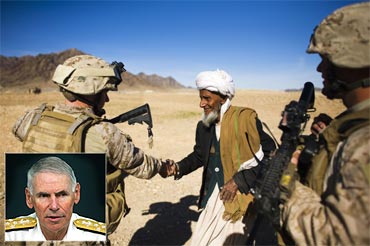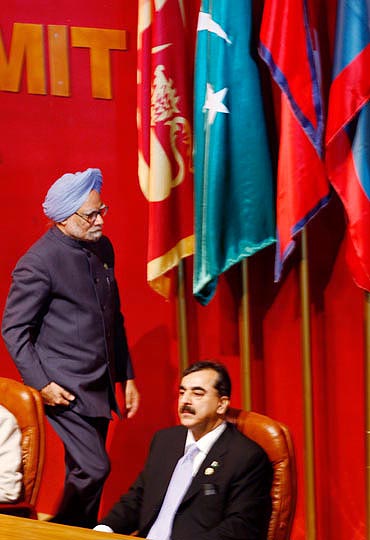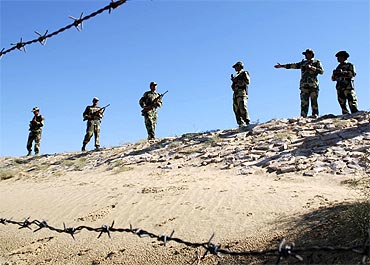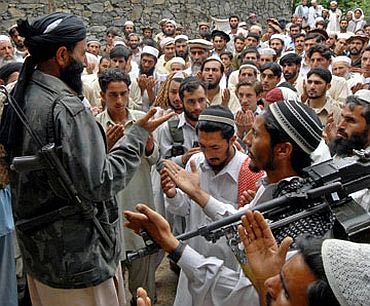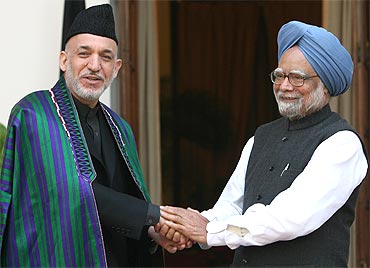 | « Back to article | Print this article |
How India-Pak peace can bring stability in Afghanistan
How do you look back at Afghanistan since you resigned nearly three years ago?
It is particularly important to recognise that in the last ten years the US has been in Afghanistan, there has not been a continuum of focus, activity and objectives. There has been an interesting mix of missions, in the business of nation-building, training and helping establish Afghan security forces in counter-terrorism, and as things began to get more and more unsettled, a third mission responsible for counter-insurgency.
Slowly, we began to have cooperation between the Pakistanis, the Afghans and US troops. But if Afghanistan has to become a viable entity, it needs to have a functioning economy.
Unfortunately, it continues to live on donations. In my experience, you have to get off that as soon as you can.
Afghanistan would not do particularly well if there was a large troop infusion, the history isn't good in this regard. Unlike in Iraq, there aren't many big urban areas except Kabul, and the problem is that putting a heavy footprint in terms of security forces has not sat very well with the local population.
On the other hand, we have to work with people to create trust and stability. This is not science, this is an art, and it is art in a dangerous situation. When you have more people, you have more people who can be attacked. It's no surprise that the casualty rates went up.
Click on NEXT to read further...
'India can play a more positive role in Afghan than Pakistan'
In recent years, even as several insurgent leaders have shifted base to Pakistan, the country has been through a lot of turmoil, which has distracted it from the efforts to fight the Al Qaeda and the Taliban. India can play a much more positive role in this situation than Pakistan, for a number of reasons.
First, the turmoil within Pakistan is exacerbated by a weak government and supposedly democratic institutions. The security threat today, I believe, is not the Pakistan army, however large it is, but the continued insurgent, terrorist activity, where you have different groups with different agendas, but the same connections. They help each other. This is the biggest problem for Pakistan, and it is the biggest threat to India.
To really have a change in Pakistan, you need the Pakistanis to believe that there really is no threat from India, no intention from India to attack Pakistan or the insurgents in Pakistan. And the upshot of the history of massing forces on the border is that it perpetuates a mindset of preparing for war tomorrow, and that is not helpful in the current situation. Second, it is extremely wasteful in resources.
The point is that the threat is from terrorist, insidious activity, small, agile groups who can infiltrate into India. You have to deal with them differently than putting a million men on the border with armour. This is not the easiest thing to accept, not only by populations who have come to accept this over the decades, but by the armies themselves.
'India should thin its army from the border'
I would say, try thinning out the army from your border. Some of it has been done of course, but not enough. You need to convey the message that we believe that we have no intention of attacking you across the border, you have to inspire trust in Pakistan.
The problem is, somebody has to take the first step, and as I look at conflicts around the world, there are some typical positions, and the most common is, I know my position and I'm sticking to it, you know yours and you're sticking to it.
People who arrived in a rubber dinghy in Mumbai, well, they're not going to be stopped by forces on the border. You can flip a coin all day long, and say you should go first, but it is the bigger dog, the bigger country, the one that is better resourced, that should go first.
Some years ago, I was invited to Kashmir to take a look at the situation, there was some "de-tensioning," small steps that were welcomed by the people. But that's not enough, I believe you have to do the big things too.
The Indian government believes that the Pakistani army is also mixed up with these terrorists.
Even if this is true, how do you deal with it? Not by half a million men on the border! My experience is that the best way to deal with terrorists and insurgents is through human intelligence and information, by building trust and confidence with the people and exchanging that information in the right way. That would enable you to react in real time.
'If Aghanistan has to settle, it can't have terrorists coming from Pak'
So how does Afghanistan become a piece of the India-Pakistan puzzle?
As I look at India-Pakistan, there is no comparison in population, size, economic prowess, and military prowess. India has all these advantages. So in any kind of conflict, you're going to be very dominant. So take the first step.
Now how will this be helpful?
This could encourage the Pakistanis to see that they are not in imminent danger of being over-run by the Indian army, so with all the problems that they have within the country why would they need to keep the army on the eastern border? The problems are out there, on the western side on the Afghan border. And by the way, there are going to be people like me reminding them, constantly, hey look guys, the problem is not in the east, but in the west.
The problem is that the Pakistani army is running the show in Pakistan. Indians and Pakistanis are the same people; the cultures are the same. India has to show leadership, take the first step.
If Afghanistan has to be settled down, it cannot have more terrorists, more insurgents, more arms and more money coming through the open border with Pakistan, and nobody is doing anything about it. Everything is related, there is no independent variable here.
The Pakistanis are paranoid about India, as if it is just waiting for the whole thing to collapse the country and take them over. So how do you get rid of this paranoia? Not easy, India has to take small steps, show them it's not interested in a fight.
You get involved in the economics of the region, connecting all the way from India to Central Asia.
'India has to get more involved in economies of the region'
But what about today? What about the US, which leans towards Pakistan and doesn't want India to play a role in Afghanistan?
We do and we don't. Personally, I would be delighted if India could play a major, long-term role, but in the near term every increase in your visibility creates more paranoia in Pakistan. The challenge is to help Afghanistan without appearing to be a threat to Pakistan. So my sense is that you should go quietly and slowly, while you try and change the mindset. Get more and more involved in improving infrastructure, building electricity lines and power stations.
But training security forces? No, I don't think so.
